Which Tool is Better? Google Analytics vs Yandex Metrica
To achieve more effective results in the digital space, tracking user interaction is paramount. This is where choosing between Google Analytics and Yandex Metrica becomes crucial. As leaders in web analytics, both platforms offer comprehensive insights into user behavior, but they differ in approach and functionality. Our comparison navigates through these differences, assessing their strengths and weaknesses while placing them in the broader context of Google Analytics alternatives and free tools. Whether you're a seasoned marketer or new to the digital arena, this article will help you understand which tool better serves your need to track, analyze, and act on user interactions.
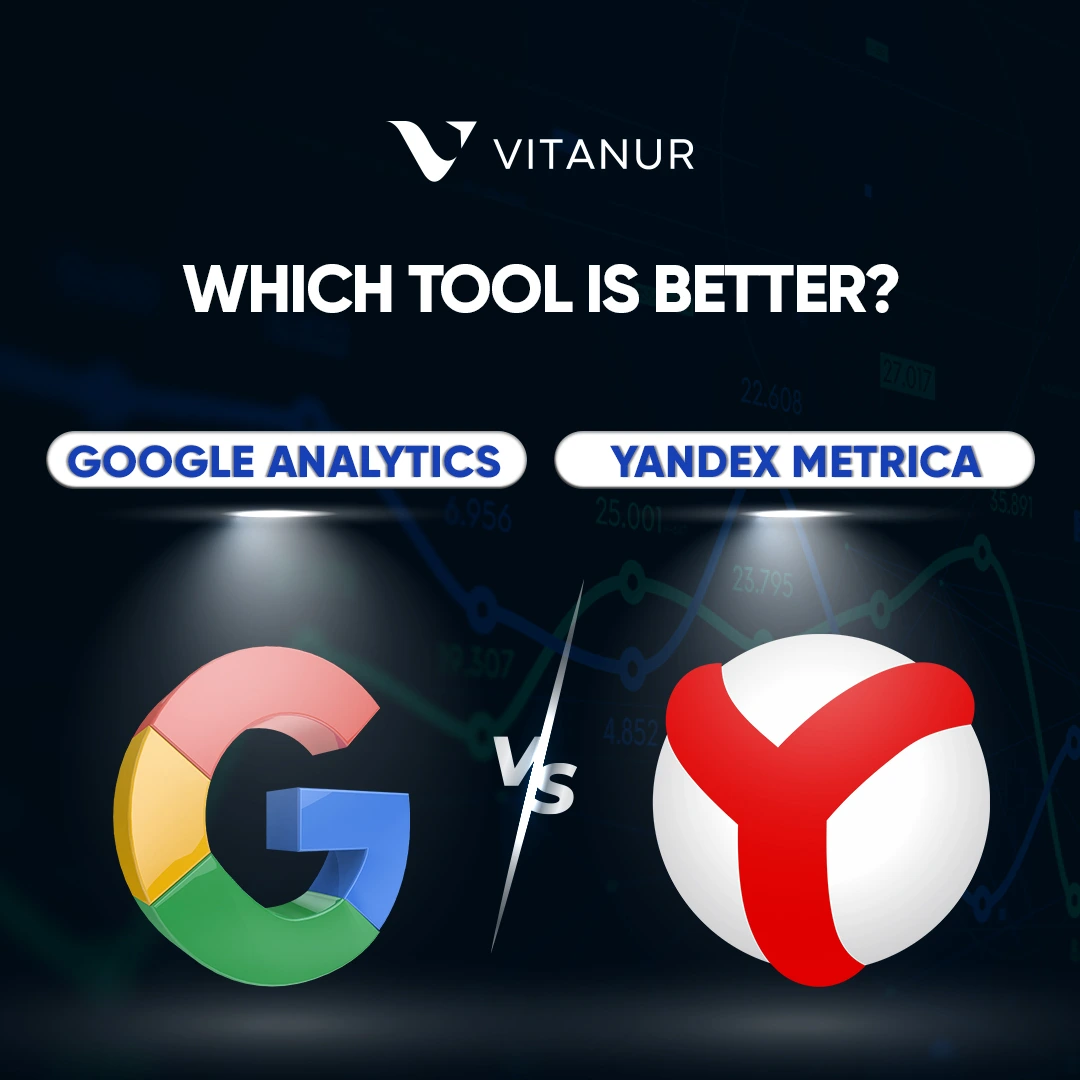
Google Analytics: Unveiling the Powerhouse
Google Analytics is a pivotal tool in web analytics, trusted by businesses and marketers worldwide. Boasting over 29 million active users, it stands as a testament to its effectiveness in providing actionable insights. Here we delve into the specific features that make Google Analytics a preferred choice for analyzing web traffic and user engagement.
Robust Data Analysis
Google Analytics excels in data analysis, offering features like Real-Time Reporting, which tracks website activity as it happens. This feature alone has revolutionized how businesses respond to user engagement, allowing for immediate action. Additionally, the Audience Overview report provides detailed insights into user demographics, interests, and behavior, a critical aspect for over 50% of marketing professionals who rely on this data for targeted marketing. This level of detail in user analytics underscores why Google Analytics is considered essential for understanding and enhancing digital presence.
Seamless Campaign Tracking
Google Analytics stands out in the field of campaign tracking with its array of advanced features. Among these, Conversion Tracking, Multi-Channel Funnels, and Google Ads integration are particularly noteworthy.
- Conversion Tracking: This feature is fundamental for understanding how different elements of your website contribute to your ultimate goals, whether they're sales, sign-ups, or other actions. By tracking conversions, businesses can pinpoint which strategies are most effective and allocate resources accordingly.
- Multi-Channel Funnels: These offer a detailed view of the customer journey across various marketing channels before a conversion occurs. This insight is crucial for understanding the role and impact of each channel in the conversion process, helping businesses to optimize their marketing mix.
- Google Ads Integration: This integration allows for an in-depth analysis of ad performance and ROI. By linking Google Analytics with Google Ads, businesses gain access to detailed data about how their ads are driving traffic and conversions, enabling them to fine-tune their advertising strategies for maximum effectiveness.
- Campaign URL Builder: A specific feature that deserves mention is the Campaign URL Builder. This tool allows marketers to add custom campaign parameters to URLs. When users click on these custom links, the unique parameters are sent to Google Analytics, providing detailed insights into the effectiveness of each campaign. This feature is especially useful for tracking the performance of marketing campaigns across various platforms and mediums.
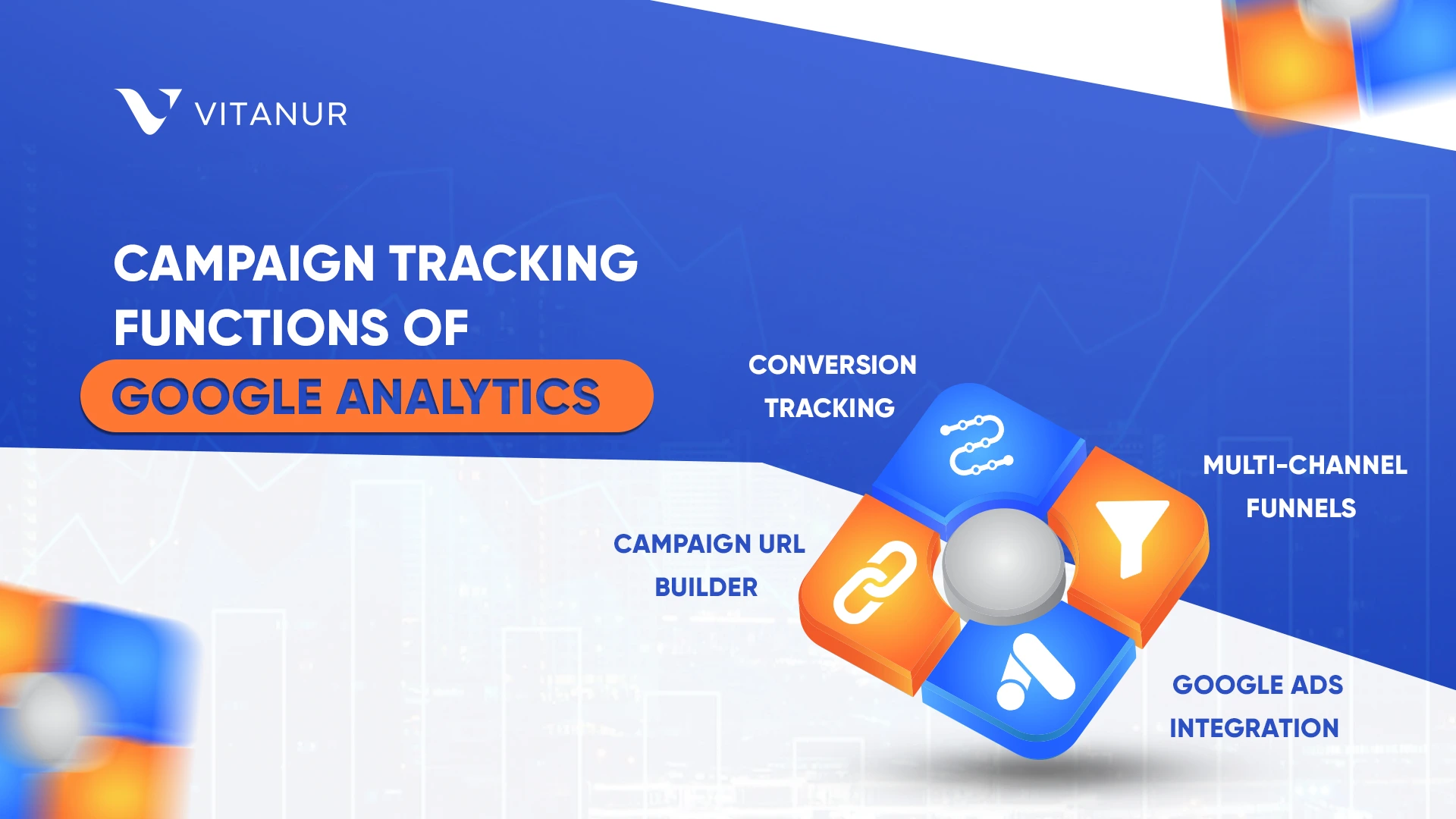
These features collectively make Google Analytics a powerful tool for campaign tracking, helping 60% of marketers who rely on it to gain a comprehensive understanding of their marketing efforts and their impact on conversions. This advanced functionality is key for businesses focused on maximizing their advertising ROI and making data-driven marketing decisions.
Pros of Google Analytics
Google Analytics is more than just a robust analytics tool; it offers a range of key benefits that elevate it as a top choice for businesses and digital marketers. These strengths play a significant role in its popularity and in its ranking in search results related to the best website analytics tools and alternatives to Google Analytics.
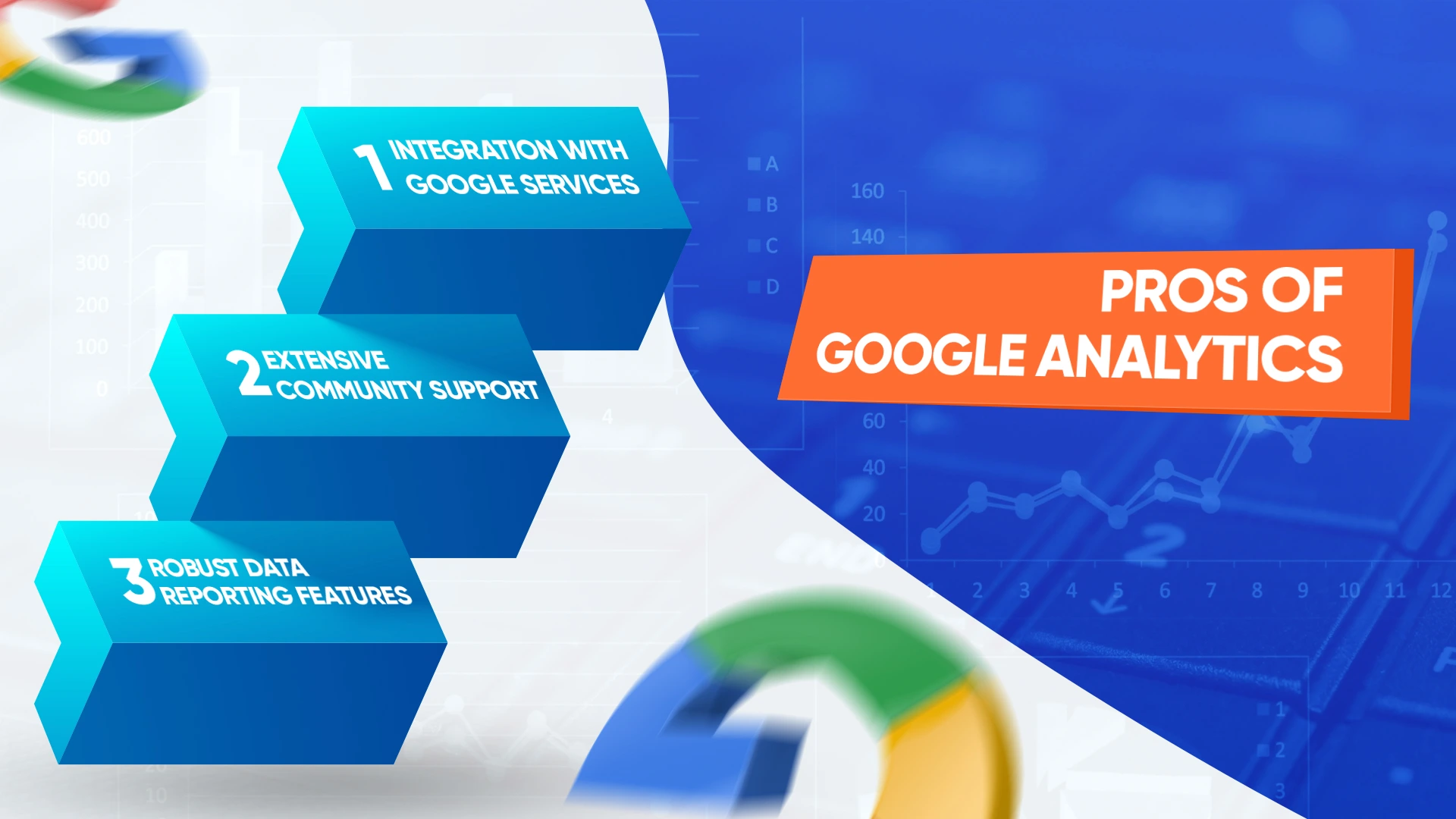
Integration with Other Google Services
A major advantage of Google Analytics is its integration with various Google services, like Google Ads, Search Console, and Google Tag Manager. This harmonization allows for a more cohesive and efficient management of digital marketing efforts, providing a comprehensive overview of an organization's online activities. For businesses heavily invested in the Google ecosystem, this integration streamlines processes and ensures a consistent data flow across different platforms, positioning Google Analytics as a crucial element in their digital strategy.
Extensive Community Support
The extensive and active community surrounding Google Analytics is a significant asset. With various forums, discussion groups, dedicated blogs, and YouTube channels, there is a wealth of knowledge and support available. This community is particularly valuable for new users or those seeking to deepen their understanding of complex features. The availability of online courses and certifications on Google Analytics further enhances the ability of users to fully utilize the tool.
Robust Data Reporting Features
Central to the appeal of Google Analytics is its wide array of data reporting capabilities. The platform provides diverse reports and analytics, covering aspects from real-time data tracking to in-depth user behavior analysis and detailed campaign performance metrics. These features enable businesses to collect extensive insights into their website's traffic and user engagement. Moreover, the customization options available for reports and dashboards allow businesses to focus on the specific metrics that are most relevant to their objectives, ensuring an analytics experience that is tailored to their needs.
Cons of Google Analytics
While Google Analytics is a powerful tool with many advantages, as previously discussed, it's also important to consider its limitations. Understanding these drawbacks is essential for businesses and digital marketers when evaluating Google Analytics against other web analytics tools.
Data Sampling in Certain Scenarios
One of the limitations of Google Analytics is its approach to data sampling, particularly evident in situations involving large datasets or complex reporting requirements. Data sampling is a method employed by Google Analytics to manage and process extensive amounts of data more efficiently. In this process, the system selects a subset of data, such as a fraction of total user interactions, and extrapolates insights from this sample instead of analyzing the entire dataset. This method is frequently applied in scenarios where a website experiences high traffic volumes, or when reports are configured with advanced segments and customizations.
For example, consider a high-traffic website receiving millions of visits per month. When generating advanced reports for such volumes, Google Analytics might base its analysis on a sample, say 500,000 visits, rather than the total 2 million visits. While this approach significantly speeds up the data processing time, it can compromise the precision of the results. This becomes a critical issue for large-scale websites or e-commerce platforms, where every interaction and transaction could provide vital insights. In such cases, relying on sampled data can lead to a less accurate understanding of user behavior and potentially misinformed decision-making.
Privacy Concerns
In an era where data privacy is increasingly crucial, Google Analytics faces challenges regarding its handling of user data, particularly under stringent regulations like the General Data Protection Regulation (GDPR) in Europe and the California Consumer Privacy Act (CCPA) in the United States. These regulations impose strict rules on data collection, processing, and storage, affecting how tools like Google Analytics operate. For instance, GDPR requires explicit user consent for data collection, significantly impacting the use of Google Analytics cookies, while CCPA grants rights to California residents regarding their personal data, including access and opt-out provisions. These privacy concerns are leading some businesses to consider Google Analytics alternatives that offer stronger privacy controls or are more tailored to specific regional legal requirements, highlighting the importance of compliance and user privacy in the current digital landscape.
Reliance on Third-Party Cookies
Google Analytics' dependence on third-party cookies for tracking user behavior is another limitation. With the growing trend of cookie-less browsers and enhanced privacy settings, the effectiveness of tracking is potentially reduced. This could impact the accuracy of data collected, especially in understanding cross-site user behavior and tracking conversions.
In summary, while Google Analytics offers robust analytics capabilities, integrations, and community support, it's important to weigh these against its limitations like data sampling, privacy concerns, and reliance on third-party cookies. These factors can influence the decision of businesses looking for the most suitable web analytics tool for their needs.
Visual Insights with Heat Maps
Yandex Metrica's Heat Maps are a remarkable feature for visualizing user interactions. They offer detailed insights into how users engage with a website, highlighting key areas of user activity. Specific aspects of Heat Maps include:
- Click Maps: Show where users click on a page, indicating what attracts their attention or prompts action.
- Scroll Maps: Illustrate how far down users scroll on a page, helping identify the length at which content retains user interest.
- Move Maps: Track mouse movement, often correlating with eye tracking to show areas where users might be focusing.
These Heat Maps can be particularly insightful for optimizing website layout, improving content placement, and ensuring key calls-to-action are in high-traffic areas. They transform abstract data into easy-to-understand visual formats, making it simpler to identify patterns and make informed changes.
Integration with Yandex Advertising
For those heavily invested in the Yandex ecosystem, the seamless integration of Yandex Metrica with Yandex Advertising is a significant benefit. This feature enables comprehensive tracking and analysis of advertising campaigns on Yandex platforms, directly correlating ad performance with user behavior data. This integration is key for marketers using Yandex Advertising, as it provides a holistic view of the effectiveness of their marketing efforts.
User-Driven Customization
Yandex Metrica stands out for its user-centric approach to analytics, offering features that allow for extensive customization. These include:
- Customizable Dashboard: Users can create a dashboard tailored to their specific needs, focusing on the metrics and data most relevant to their goals.
- Flexible Goal Setting: Yandex Metrica allows users to define their own conversion goals, adapting to a variety of business objectives and user actions.
- Adjustable Reports: Users have the ability to customize reports, selecting and organizing information that best aligns with their analytics strategy.
This level of customization ensures that users can mold the analytics tool to fit their unique requirements, making Yandex Metrica a versatile option for businesses with diverse analytics needs.
Advanced Tools: Session Replay and Form Analysis
Adding to its unique offerings, Yandex Metrica includes advanced tools like Session Replay and Form Analysis. Session Replay enables users to watch recordings of user sessions, offering deep insights into the user journey on their website. Form Analysis, meanwhile, provides detailed information on how users interact with forms on the site, identifying potential barriers to completion.
By incorporating these specific features, Yandex Metrica demonstrates its capability to provide deep, user-centric insights and a highly adaptable analytics experience. These elements make it a strong candidate for those seeking a comprehensive analytics tool with a focus on visual data interpretation and customization.
Pros of Yandex Metrica
Yandex Metrica, with its array of distinctive features such as Heat Maps and user-driven customization, brings several significant advantages to the table in the web analytics landscape. These strengths not only underscore Yandex Metrica's position as a top contender in the best website analytics tool category but also bolster its prominence in search engine results.
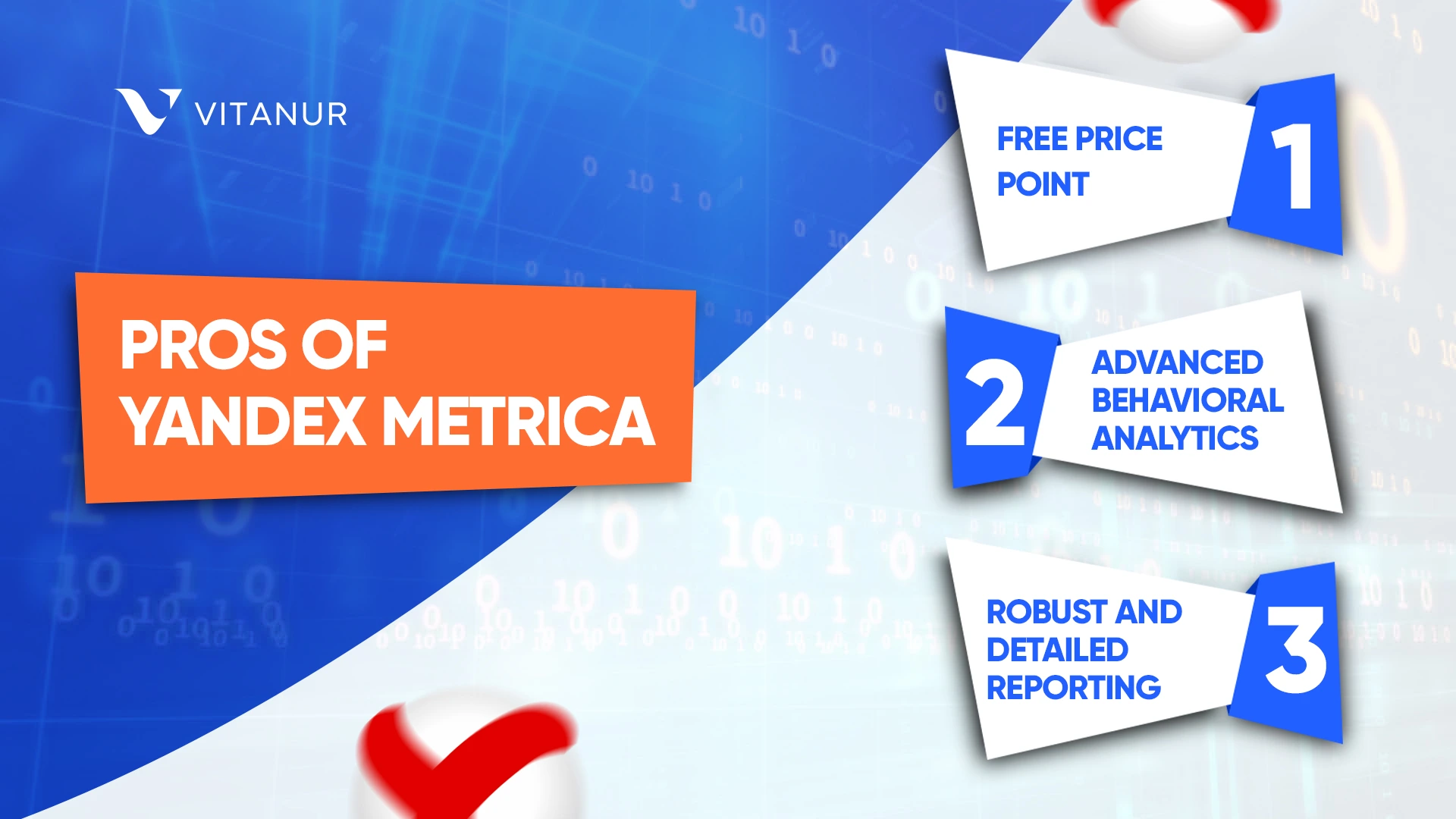
Free Price Point
A standout advantage of Yandex Metrica is its zero cost. This aspect is particularly attractive for businesses seeking comprehensive web analytics solutions without incurring additional expenses. The free availability of Yandex Metrica democratizes access to advanced analytics, making it an ideal choice for small and medium-sized businesses or startups operating on tight budgets.
Advanced Behavioral Analytics Features
Yandex Metrica stands out with its cutting-edge behavioral analytics capabilities, providing a granular view of how users engage with a website. Key features include:
- Heat Maps: These visually indicate where users click, hover, and interact the most on a webpage, revealing high-engagement areas and spots that might need improvement.
- Session Replay: This tool records and plays back individual user sessions, showing exact pathways users take, including clicks, scrolls, and mouse movements. It's invaluable for identifying usability issues or enhancing user journey flow.
- Detailed Bounce Rate Analysis: Yandex Metrica offers an in-depth look at bounce rates, segmenting them by user behavior and page interactions. This helps in understanding why users might be leaving the site quickly and what can be done to keep them engaged longer.
- Form Analysis: This feature tracks how users interact with forms on a site, identifying fields that cause drop-offs or hesitations, which is crucial for optimizing form design and improving conversion rates.
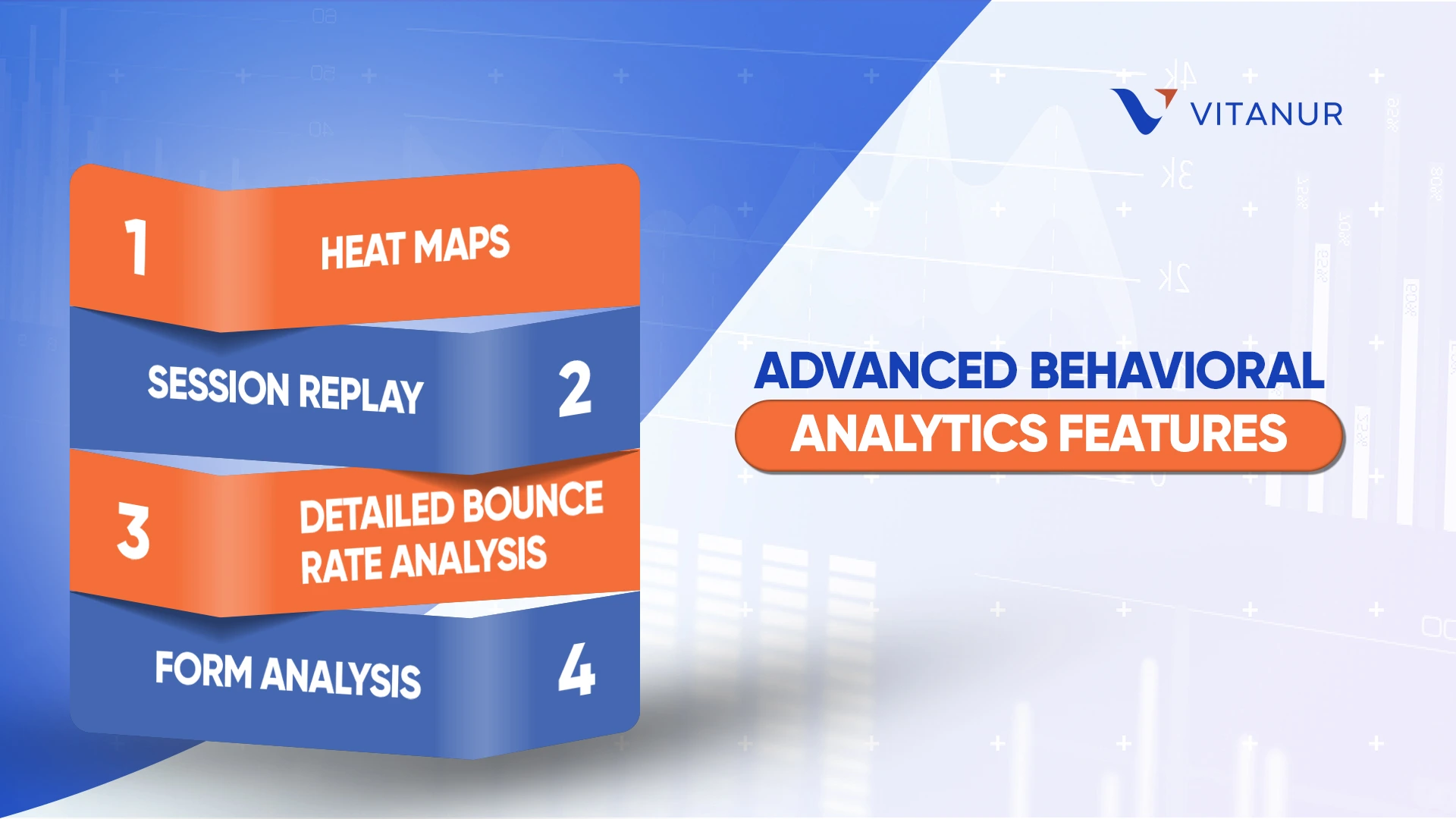
Together, these advanced tools provide comprehensive insights into user behavior, enabling businesses to make data-driven decisions to enhance website usability, improve user experience, and ultimately boost performance metrics.
Robust and Detailed Reporting
Furthermore, Yandex Metrica's robust and customizable reporting feature sets it apart. It allows users to tailor reports to their specific analytical needs, whether they're tracking simple traffic data or seeking deeper insights into user behavior. This flexibility makes Yandex Metrica a versatile tool for a wide range of data analysis requirements.
To sum up, the combination of being a free tool, offering advanced behavioral analytics, and providing detailed, customizable reporting, positions Yandex Metrica as a highly competitive option in the web analytics market. Its capabilities cater to a broad spectrum of users, from those with budget constraints to data-centric organizations seeking in-depth web analytics.
Cons of Yandex Metrica
While Yandex Metrica is renowned for its advanced behavioral analytics and customizable features, it's equally important to recognize its limitations. A key concern is its smaller user base compared to larger platforms like Google Analytics. This limitation can influence various aspects of the tool, from community support to resource availability, impacting its overall utility for some users.
The smaller user base of Yandex Metrica often means less community-driven support and fewer external learning resources. Unlike more popular analytics tools, users might find limited forums, discussion groups, and user-generated content, which are crucial for troubleshooting, sharing best practices, and learning advanced features. This scarcity can pose a challenge, especially for those who rely heavily on community support for guidance and problem-solving.
Additionally, the limited popularity of Yandex Metrica affects the availability of external educational resources. There are comparatively fewer tutorials, in-depth case studies, and professional training courses available for Yandex Metrica than for its more widely-used counterparts. This can be a significant drawback for users who prefer structured learning or need comprehensive resources to master the analytics platform.
Another consideration is Yandex Metrica's regional focus. While it operates globally, its features and integrations are often perceived as being more tailored to the Russian market, where Yandex is a key player. This regional inclination might affect the tool's effectiveness or relevance for businesses targeting audiences outside of this primary market.
When considering Google Analytics and Yandex Metrica for web analytics, it's evident that both platforms bring unique strengths and face distinct challenges. Google Analytics is celebrated for its extensive user base, seamless integration with Google services, and sophisticated campaign tracking abilities, yet it grapples with issues like data sampling and privacy concerns. Yandex Metrica, on the other hand, offers innovative features like heat maps and advanced behavioral analytics for free, but its smaller user base and regional focus might limit its appeal for some users.
The decision between Google Analytics and Yandex Metrica should align with your specific analytical needs and business objectives. Each platform has the potential to provide deep insights and enhance your digital marketing strategies. For a more comprehensive exploration of digital marketing and to delve into various related topics, our form section is a rich resource worth exploring.




Write a comment
Your email address will not be published. Required fields are marked *